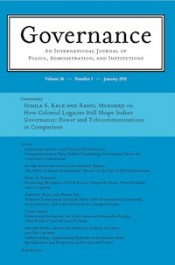Archive for the ‘Uncategorized’ Category
Enforcing India’s right to education
 India’s Right to Education Act, adopted in 2009, creates a binding obligation on the state to provide elementary education to all children between 6 and 14 years. But little academic attention has been paid to the mechanisms that are crucial to the enforcement of such rights. In the current issue of Governance, Malini Bhattacharjee and Dolashree Mysoor examine how redress procedures for the Right to Education Act work in the state of Karnataka. “The design of the grievance redress mechanism under the RTE Act in Karnataka,” they conclude, “is ill-equipped to deal with a variety of complaints that may arise and ineffective in enforcing the right to education.” Read the article.
India’s Right to Education Act, adopted in 2009, creates a binding obligation on the state to provide elementary education to all children between 6 and 14 years. But little academic attention has been paid to the mechanisms that are crucial to the enforcement of such rights. In the current issue of Governance, Malini Bhattacharjee and Dolashree Mysoor examine how redress procedures for the Right to Education Act work in the state of Karnataka. “The design of the grievance redress mechanism under the RTE Act in Karnataka,” they conclude, “is ill-equipped to deal with a variety of complaints that may arise and ineffective in enforcing the right to education.” Read the article.
Why the UK Parliament really does matter
 Conventional wisdom says that legislatures in parliamentary systems don’t matter very much — and that the British Parliament provides strong evidence of this reality. In the current issue ofGovernance, Meg Russell and Philip Cowley take issue with the prevailing view. Researchers have focused too much on the decision-making stage, while neglecting Parliament’s role at earlier and later policy stages, as well as behind-the-scenes negotiations. After analyzing 6,000 parliamentary votes, 4,000 legislative amendments, 1,000 committee recommendations, and 500 interviews, Russell and Cowley conclude that Westminster’s influence is substantial and rising. Read the article.
Conventional wisdom says that legislatures in parliamentary systems don’t matter very much — and that the British Parliament provides strong evidence of this reality. In the current issue ofGovernance, Meg Russell and Philip Cowley take issue with the prevailing view. Researchers have focused too much on the decision-making stage, while neglecting Parliament’s role at earlier and later policy stages, as well as behind-the-scenes negotiations. After analyzing 6,000 parliamentary votes, 4,000 legislative amendments, 1,000 committee recommendations, and 500 interviews, Russell and Cowley conclude that Westminster’s influence is substantial and rising. Read the article.Book reviews: Strife in the Middle East, public finance in developing countries
 In his new book, Will the Middle East Implode?, Mohammed Ayob says that there is “a serious danger of a a chain reaction” of implosions “that could engulf much of the region.” Ramazan Erdag reviews the book in the current issue of Governance, along with Rewiring Regional Security in a Fragmented World, edited by Chester A. Crocker, Fen Osler Hampson, and Pamela Aall.“Taken together,” says Erdag, “these two volumes make a significant contribution to international security matters by providing in-depth regional analysis of the current crises facing the Middle East.” Read the review.
In his new book, Will the Middle East Implode?, Mohammed Ayob says that there is “a serious danger of a a chain reaction” of implosions “that could engulf much of the region.” Ramazan Erdag reviews the book in the current issue of Governance, along with Rewiring Regional Security in a Fragmented World, edited by Chester A. Crocker, Fen Osler Hampson, and Pamela Aall.“Taken together,” says Erdag, “these two volumes make a significant contribution to international security matters by providing in-depth regional analysis of the current crises facing the Middle East.” Read the review.
Explaining how and why indirect rule persists
 It’s commonplace for scholars to explain weak state institutions in many countries as a result of the practice of indirect rule in the colonial era. In the current issue of Governance, Adnan Naseemullah and Paul Staniland argue that this story needs to be refined. In fact, the broad label of “indirect rule” has been applied to “a diverse set of governance forms that need to be clearly distinguished.” Some of those practices persist today — but not simply because of path dependence. Post-colonial governments “have made conscious choices about how to govern,” and used some modes of indirect rule to accommodate the reality of “limited governing resources.” Read the article.
It’s commonplace for scholars to explain weak state institutions in many countries as a result of the practice of indirect rule in the colonial era. In the current issue of Governance, Adnan Naseemullah and Paul Staniland argue that this story needs to be refined. In fact, the broad label of “indirect rule” has been applied to “a diverse set of governance forms that need to be clearly distinguished.” Some of those practices persist today — but not simply because of path dependence. Post-colonial governments “have made conscious choices about how to govern,” and used some modes of indirect rule to accommodate the reality of “limited governing resources.” Read the article.Notice to authors: New journal design
The editors of Governance have been notified by Wiley, the journal’s publisher, that it will adopt a new design for articles beginning in early March. Wiley states that the new design “will optimize journals for the online environment, leading to reduced time from author submission to publication. These changes will improve the author experience by allowing for a more efficient publishing process, reducing time spent on typesetting and layout checking. We also anticipate that this will reduce the number of errors requiring author correction during proofing.” The generic sample of the new design that has been provided for Governance can be viewed here.
How Russia used self-regulation to evade corruption
 In 2010, something odd happened in the Russian construction sector. The “control-oriented” Russian government decided to hand off regulatory power to the private sector — and did this despite objections of the industry itself. In the current issue ofGovernance, Masha Hedberg explains this “perplexing” development. The Russian government wanted to sidestep an ineffective and corrupt bureaucracy, while industry leaders recognized that the new regime was likely to be tougher than the status quo. Hedberg says that conventional explanations of delegation neglect cases like this, in which “low capacity bureaucracies severely curtail the government’s ability to enact its policy agenda.” Read the article.
In 2010, something odd happened in the Russian construction sector. The “control-oriented” Russian government decided to hand off regulatory power to the private sector — and did this despite objections of the industry itself. In the current issue ofGovernance, Masha Hedberg explains this “perplexing” development. The Russian government wanted to sidestep an ineffective and corrupt bureaucracy, while industry leaders recognized that the new regime was likely to be tougher than the status quo. Hedberg says that conventional explanations of delegation neglect cases like this, in which “low capacity bureaucracies severely curtail the government’s ability to enact its policy agenda.” Read the article.

